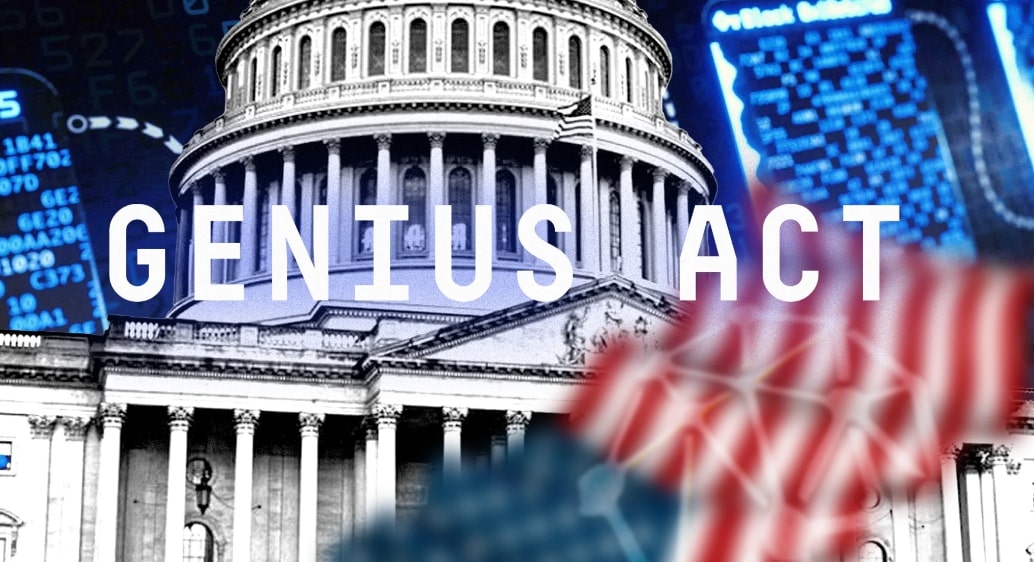Key Takeaways:
- The U.S. House has passed the bipartisan GENIUS Act, a landmark bill creating a regulatory framework for stablecoins.
- The legislation now awaits presidential approval and is seen as a major push to establish the U.S. as a global crypto leader.
- The bill mandates full reserve backing and monthly transparency for stablecoin issuers, reshaping the digital dollar landscape.
As momentum builds in Washington, the cryptocurrency sector has just witnessed a historic moment. The U.S. House of Representatives has passed the long-anticipated GENIUS Act, a sweeping piece of legislation that could finally bring clarity and structure to stablecoin regulation and potentially establish the United States as the next crypto superpower.
Read More: GENIUS Act 2025 – All You Need to Know About This New Stablecoin Regulation

GENIUS Act: What’s Inside the Bill?
The GENIUS Act (Guiding and Establishing National Innovation for U.S. Stablecoins) passed the House in a resounding 308–122 vote, signaling broad bipartisan support. The bill introduces strict but clear requirements for stablecoin issuers, including:
- Full reserve backing by liquid U.S. dollar assets, such as cash or short-term Treasuries
- Mandatory monthly disclosures of reserve composition
- Licensing and supervision of stablecoin issuers under a federal regulatory framework
These would help to reduce systemic risk, increase consumer protection, as well as to increase the confidence of investors in the most popular crypto payment tools.
Since the market capitalization of stablecoins has surpassed the $262 billion mark worldwide and the volume of on-chain transactions in stablecoins has grown to more than 70%, policymakers believe the U.S. could no longer afford to stay reactive. According to Senator Bill Hagerty, the bill’s sponsor, this move is essential to “bring our payment system into the 21st century” and ensure that “the U.S. dollar retains its global dominance in digital finance.”
Read More: U.S. Senate Passes the GENIUS Act — What’s Really Inside the $3.7 Trillion Crypto Bill?


Why Stablecoins Matter for U.S. Crypto Strategy
Stablecoins are essentially digital versions of fiat pegged currencies (mostly the U.S. dollar), used as a medium of exchange, settlement layer, collateral in DeFi and crypto trading.
Their function has grown more critical, as more and more institutional and cross-border trades migrate toward on-chain settlement. But the lack of regulatory clarity has raised the alarm for both lawmakers and market participants, particularly after several high-profile collapses such as TerraUSD’s in 2022.
The GENIUS Act addresses those risks by requiring transparency and solvency: key gaps that previous crypto projects exploited.
“We’ve seen what happens when stablecoins operate without guardrails. This bill sets those guardrails without crushing innovation,” noted a senior policy advisor familiar with the legislation.
Beyond regulation, the bill also strategically aligns the U.S. with crypto dollarization, positioning dollar-backed stablecoins as the default digital currency for global trade, remittances, and digital commerce.
What’s Next: GENIUS Heads to Trump’s Desk
The GENIUS Act now heads to President Trump’s desk, where it’s widely expected to be signed into law. Trump has recently made bold promises to turn the U.S. into the “crypto capital of the world,” and the GENIUS Act would mark his first major legislative action supporting that claim.
While the Senate has yet to review the Clarity Act and the CBDC ban (two related bills passed by the House on the same day), the GENIUS Act is fast-tracked because of its wide-reaching impact on U.S. monetary infrastructure.
“I look forward to POTUS signing GENIUS into law,” Senator Hagerty posted on X. “It’s the first step in establishing America’s crypto leadership.”
The bill’s passage marks a dramatic shift in tone from the previous administration’s more cautious, often antagonistic stance toward the crypto industry.
Industry Reaction and Market Impact
The crypto industry has responded with overwhelming support. Within hours of the bill’s passage, major players like Circle, Tether, and PayPal (issuer of PYUSD) issued statements applauding the move.
“A clear and secure regulatory environment is exactly what the U.S. needs to stay ahead in financial innovation,” said Jeremy Allaire, CEO of Circle, in a public release.
Market signals followed suit. The market capitalization of USDC and USDT in circulation and issuance rose by $1.2 billion in a 48-hour period, while trading volumes on top U.S. exchanges surged by nearly 15%.
Advocates for crypto also cheered the bill for subjecting bank-issued and non-bank-issued stablecoins to the same regulatory requirements, a move which they said could encourage greater competition and innovation in the space.
The Political Stakes: Crypto Enters the Election Arena
The GENIUS Act’s timing couldn’t be more politically charged. With the election cycle of 2024 becoming more heated, crypto regulation is turning into a gut-check point in US economic policy.
Supporters of cryptocurrencies are getting louder and the push by the industry is getting more intense. The OpenSecrets reported that the crypto industry had spent more than 119 million in the last cycle to give financial help to candidates with positive positions regarding cryptocurrency. This year, there would be an increase in this figure.
The combination of the GOP having taken over the majority in the House and Trump himself emerging back to the mainstream of politics has offered a highly opportune streak in which pro-crypto bills can be passed due to the realities of the current environment creating no better time for them to exist in terms of viability and practicality in the crossing of the finish line accordingly.













